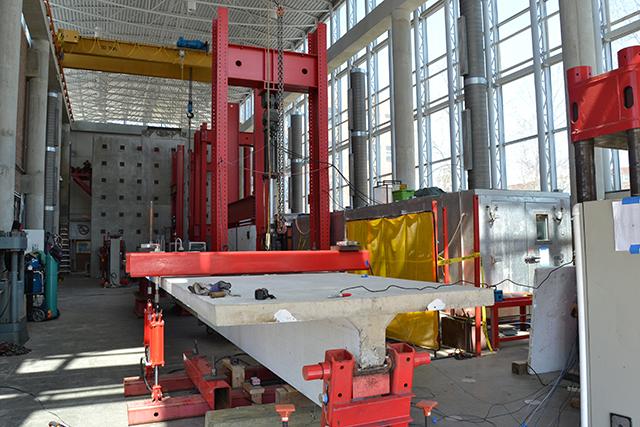N.C. State’s Constructed Facilities Laboratory can easily be missed among the huge buildings typical of Centennial Campus, but the research that has been generated and the objects that have been tested inside it and have turned the lab into a nationally-renowned workspace.
The CFL, which was founded in 1995, is a graduate-research facility in the Department of civil-construction and environmental engineering, according to Lab Manager Greg Lucier who has worked at the lab for more than 10 years. The primary goal of the lab is to conduct experiments that support structures, materials and geotechnical research in the department, but the lab often sees third-party action as well.
According to Lucier, the lab tested the wooden beams in Raleigh-Durham International airport’s new terminal, helicopter blades and the foundational steel bars for the World Trade Center’s replacement: the One World Trade Center in New York City.
Though Lucier said similar labs can be found all around the world, there aren’t many of them that can compare to the CFL. Lucier estimated there are probably a dozen labs with capabilities equal to or greater than the CFL in the country and that only one other lab in the Southeast has similar capacities.
“We have a unique set of capabilities here in terms of large-scale testing, the way we can interact with traditional research and industry and in terms of how we run and manage our work,” Lucier said.
Lucier said he and other faculty members, researchers and students almost always test the steel, concrete and wooden objects “all the way to failure,” but it’s what happens to the objects up until that point that really matter.
“Failure is very interesting because you learn from studying it, but in civil and structural engineering in particular, the goal of the design is to prevent a failure,” Lucier said. “We’re often looking at how things crack, deform and move well before they get to the point where they fail. We want to understand how a structure behaves during its service life under the loading it typically sees.”
Lucier said third-party projects aren’t typical for the lab, but they are interesting.
“We focus on traditional research and experiments where professors or principal investigators come to us in support of some broad research effort,” Lucier said. “The lab experiment could possibly be a large experiment but only a small part of the research.”
However, the lab is also sought after by “industrial clients,” which include engineering or architecture firms, construction companies, and the North Carolina Department of Transportation, Lucier said. The lab has even tested materials designed to repair nuclear power plants across the southern United States.
“These clients might have a new product or a new system or need to figure something out about a problem they have in the field,” Lucier said. “Maybe they designed something, and it didn’t work out well. In that case, we would do a test, and we would report the results to that industrial client.”
The lab usually works with traditional materials such as concrete, steel and wood, which are used for civil engineering projects, according to Lucier. However, CFL staff have also been increasingly their use of new materials, such as carbon fiber, glass fiber and different composites for repairing or improving civil infrastructure.
“We’ve gotten into exotic tests like testing bullet-proof glass for mine-resistant vehicles simply because of the large forces required to test 5-6 inch thick glass, and because we have the capability,” Lucier said.
Lucier said he’s seen the CFL grow since his arrival and foresees more growth in the future.
“Since I’ve been here we’ve increased our activity level tremendously,” Lucier said. “We’ve gotten busier and added more staff and students, and as we move forward we’re looking forward to growing even more. In the civil engineering field, we’re looked at as one of the premier facilities in the country for a lot of these specialized testing needs, and that’s something we want to continue.”
One of these students who has taken advantage of the lab’s growing presence is Ph.D. Armita Mohammadian, who works at the CFL studying the kinetics of corrosion of steel in concrete as well as passivation and depassivation of steel in concrete.
An academic advisor in Mohammadian’s home country of Iran who received his Ph.D at N.C. State, told her about the CFL and doctoral programs at the University.
“It’s a unique situation in the lab because there are a lot of international people working together doing great work,” Mohammadian said. “It’s a really friendly environment, and they give you a lot of independence as long as you’re safe and trained to work on the equipment.”








